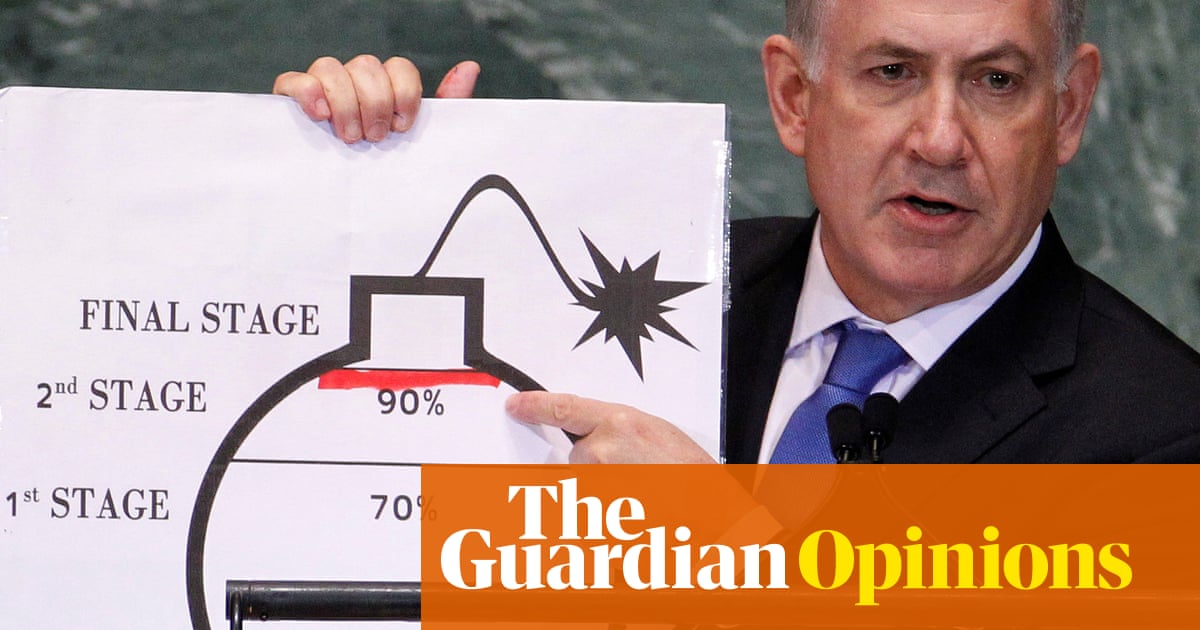Benjamin Netanyahumust be stopped. The Israeli prime minister’s lust for war as a solution to his myriad problems is nothing short of a threat to us all, one that extends far beyond Israel’s neighbors. Netanyahu knows no other way. War is his doctrine. War is his reflex. War is his answer. He believes the power of war will unite Israeli society and will stifle any American criticism of him, necessary since the machinery he needs to make his wars comes mostly from Washington. And, with his aggression against Iran, he seeks to drag the United States further into another endless military quagmire in the region and light the world on fire.
Early on Friday morning, Israel launched a series of unprovoked strikes against Iran, targeting Iran’s nuclear energy facilities, its top scientists, its military commanders, and parts of its military and civilian infrastructure. Television imagesshowa residential building in Tehran damaged by what looks like a missile attack. Iran, which has not suffered an assault this severe since its war with Iraq in the 1980s, isreportingat least 70 people killed and 320 injured thus far. Meanwhile, Israel’sgenocidal campaign in Gazacontinues out of the public eye, as aninternet blackouthalted most aid operations.
Netanyahu argues that the Israeli attack on Iran was a “pre-emptive strike” against a clandestine nuclear weapons program. But that’s simply a lie. A “pre-emptive” strike requires an imminent threat of invasion or military force. Iran was not imminently about to attack Israel, with or without a nuclear weapon. What Israel engaged in last night was better described by its defense minister as a “preventive” strike against an opponent’s infrastructure.
Regardless of what you think about Iran’s nuclear energy program, about the status ofnegotiationswith the United States regarding its nuclear program, or about recentpressurethe International Atomic Energy Agency has brought on Iran, a preventive strike by Israel against a sovereign nation is a blatant act of aggression. It is fundamentally illegal under international law and will further erode the prospect of sovereign states living in peace and security with each other.
Iran has long claimed that it is only pursuing a civilian nuclear energy program and has no ambition to make a nuclear weapon. That might also be a lie, but who would blame them for wanting such a deterrent now? It’s widelyunderstoodthat North Korea’s nuclear arsenal effectively functions as a deterrent against an American attack, after all.
Israel, which isbelievedto have about 90 nuclear warheads and enough plutonium for many more,refusesto sign the Nuclear Non-Proliferation Treaty (NPT), the only country in the region to do so. That refusal has also made thelong desired goalof a nuclear-free Middle East impossible.
And anyway, there’s always been something deeply racist about which country is or is not permitted to develop nuclear weapons. In a briefingpaper, the Nobel prize-winning International Campaign to Abolish Nuclear Weapons states that “racism is ingrained in nuclear weapons history and doctrine”, and that non-western states are regarded “as ‘irrational’, ‘emotional’ and somehow ‘less capable’ of negotiating a Treaty than Western governments”. Let’s remember that the United States is the only country to use a nuclear weapon. Twice. As the briefing paperpointsout, the US “public widely supported the bombing partly due to anti-Japanese racism, depicting Japanese people in subhuman terms, in some cases fit for extermination”.
Netanyahu needs his external enemies to survive his internal divisions. A day before launching this aggression on Iran, his coalition barely survived a vote to dissolve parliament. (The issue driving the vote was the compulsory military service of ultra-Orthodox men.) As war with Iran has now become a very real possibility, talks about his fragile coalition will recede. This is the same Netanyahu whopropped up Hamas for yearsto thwart the establishment of a Palestinian state. This is the same Netanyahu whobroke the ceasefirein Gaza in March of this year. This is the same Netanyahu who, in the latest negotiations about a ceasefire in Gaza, reportedlywon’t even agree to Hamas relinquishing power in Gaza, so dependent is he on creating and maintaining external enemies for his own survival.
Is Donald Trump getting dragged into a war of Netanyahu’s making or is he willingly joining a partnership of aggressors? Netanyahu hassaidthe US knew about the attack in advance, but even if the US is sleepwalking its way into war, the prospect of another US-sponsored conflagration is a terrible one (and certainly won’t get Trump his much-desired Nobel peace prize). If there is one thing the people of this region do not need, it is more war, the effects of which could also reverberate terribly around Europe and the rest of the world.
Where are the European leaders now? Will Keir Starmer, Emmanuel Macron, and Friedrich Merz stand up to Netanyahu and Trump? Will they use some real power to reject Netanyahu’s warmaking barbarism, based as it is on naked domination, supremacy, violence and conquest, or will we hear only vague and useless platitudes about “restraint” after the fact? Western European leaders constantly talk about how much they value peace, justice, equality and the rule of law. Now is the time to put those words into practice.
Moustafa Bayoumi is a Guardian US columnist
